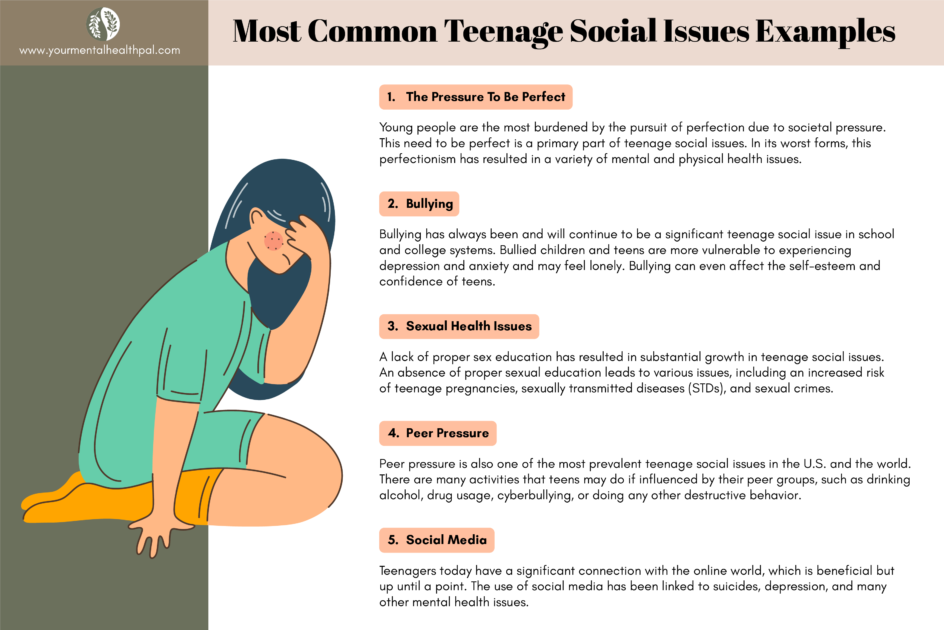
The last few years have been tough on all of us. Hurt and change have seeped into every corner of our lives. The mental health of teenagers is no exception.
The younger generation has faced issues that we haven’t. A majority of them have lost the most critical years of social growth. They have missed physical classrooms and their playtime with friends. All and all, it’s been TOUGH.
However, the teenage mental health crisis predates the pandemic.
The modern societal expectations and growth of technology have deeply impacted teenagers. This age of technology that pushes teens to showcase their perfect side is a serious cause of teenage social issues today.
The United Nations Children’s Fund (UNICEF) presented a report titled ‘State of the World’s Children‘ in 2021. It has reflected the impact of these teenage social issues on millennials‘ mental health. As per the report, a huge 13% of people between the age of 10-19 suffer from a diagnosable mental health problem.
These numbers define the extreme mental and social well-being-related crisis the younger generation faces today.
So why is this happening? What is the real cause of the problems with today’s youth?
Let us dive deeper into the reasons behind these teenage social issues.

1. The Pressure To Be Perfect
Many times, we tell the teens around us to ‘not put too much pressure‘ on themselves. Yet, even though this comes from a good place, it puts the burden of stress and anxiety the teen faces at their own feet.
A study titled ‘Perfectionism Is Increasing Overtime‘ has found that young people are the most burdened by the pursuit of perfection due to societal pressure. This need to be perfect is a primary part of teenage social issues. In its worst forms, this perfectionism has resulted in a variety of mental and physical health issues, including:
- eating disorders,
- depression,
- high blood pressure, and
- suicidal tendencies.
2. Bullying
Bullying has always been and will continue to be a significant teenage social issue in school and college systems. According to the National Center for Education Statistics, about 20.02% of teens in the U.S. experienced bullying in 2019.
Bullied children and teens are more vulnerable to experiencing depression and anxiety and may feel lonely. Bullying can even affect the self-esteem and confidence of teens.
A significant change in the act of bullying is by doing it online. This is now called cyberbullying. Since many teens remain active most of the time on social media, much bullying nowadays occurs online. Cyberbullying is becoming the dominant form of bullying because it is much harder for the authorities to catch the bully. In both cases, girls, younger students, and students who identify themselves as gay, lesbian or bisexual are more likely to be bullied.
To know more about the impact of cyberbullying, click here.
3. Sexual Health Issues
A lack of proper sex education has resulted in substantial growth in teenage social issues.
Hushed conversation, unhealthy jokes, and hidden internet searches are some of the most common ways teenagers venture into the uncharted territories of their sexuality.
However, an absence of proper sexual education leads to various issues, including an increased risk of teenage pregnancies, sexually transmitted diseases (STDs), and sexual crimes.
According to the Centers for Disease Control and Prevention (CDC), teen pregnancy rates are declining in America constantly. However, pregnancy is still one of America’s most significant teen issues. Teenage mothers face considerable stress that may lead to many mental health concerns. Similarly, the Centers for Disease Control reported that people between the age of 15-24 reported 26 million cases of STDs, i.e., half of the new infections in the year 2018.
4. Peer Pressure
Just as bullying, peer pressure is also one of the most prevalent teenage social issues in the U.S. and the world. Adolescents don’t understand the consequences of their actions and suffer the results later. The need to fit in makes them do unhealthy and sometimes even unethical things.
There are many activities that teens may do if influenced by their peer groups, such as drinking alcohol, drug usage, cyberbullying, or doing any other destructive behavior.
5. Social Media
Social media platforms like Twitter, Meta, Snapchat, etc., are fun and games until they just aren’t. Teenagers today have a significant connection with the online world, which is beneficial but up until a point. The use of social media has been linked to suicides, depression, and many other mental health issues.
A study by Carol Vidal and team found a relationship between social media and depression. Teenagers who reported spending long hours on social media were more alone and depressed than the others.
Psychiatrists are also worried about the immediate impact of increased social media usage, which includes:
- lack of outdoor activities,
- lack of proper sleep, and
- lack of social connections.
A List Of Reminders For Teens To Navigate Through Teenage Social Issues:
We have all been in your place once. The tumultuous teenage years have been a part of all our lives. The struggles and challenges you face today are new and might not have existed during our times. But we still have some advice that might help. Here’s a list of daily reminders for when you feel overwhelmed fighting your problems:
1. The quest for perfection is more or less useless.
No one is even close to being perfect. And it is time you accept it.
We know you keep on trying to fit into the ideas the society deems worthy. You search for perfection in everything you try. But we are going to tell you otherwise.
Perfection is a concept, not a reality.
Therefore, do not lose yourself trying to become what others want you to be. The world is this big crazy puzzle, and we are all different pieces.
Have you tried to complete a puzzle with a piece missing?
No, because you know the attempt is futile. Every piece matters.
That is why you matter. So do what you want. Just make sure it’s something you actually want to do. Not out of the fear of rejection and not for the need to be perfect.
2. You don’t have to change yourself to fit in, really.
“Where do I fit in?”
We have all asked this question to ourselves several times.
The answer to this is actually pretty simple. You just have to change the goal post a little bit. Instead of trying to fit in, just believe that you belong here.
Now you might feel that fitting in and belonging are the same things. But, no.
Fitting in makes us adopt a particular place or group’s beliefs, practices, and thoughts. You can fit in but never feel like you belong.
How often do you, out of the pressure of fitting in, do something that feels wrong?
That’s what fitting in makes you do.
See, we are humans. The need to seek love and belonging is inherently sewed in us. Being in a group makes us feel less alone. The love we receive changes us as people.
However, you never truly feel like you belong until you take the power of making you feel belonged from other people. That until you show up having a sense of belonging within yourself, you will never really know who you are.
Through learning to cultivate a sense of belonging within ourselves, we build a world where we can disagree with people but still respect them. We create a world where everyone can feel like they belong. We build a world where belonging is a right and not something people have to earn by losing themselves.
Together, let’s let this world grow.
3. Life doesn’t get easier as we grow, we just become better.
Teenage is a time of uncertainty.
It’s as if you don’t know what you are doing. You are changing mentally and physically. You have to make crucial decisions regarding school or college.
There is a transformation underway into the person you will become, and mentally you are just trying to like that person.
But the truth is, as you grow, life isn’t getting any easier. It only gets tougher, pal. However, you are not going to be lagging behind. You are going to grow smarter, better, and tougher as well.
The more you live through this thing called life, the more you learn.
You will find a new perspective. You will be grateful for the relationships and friendships that didn’t work out. There will always be the hard stuff, the fragility of hope, the loss – but you will keep going.
You will realize that these scary big things are actually that big or scary once you go through them. There will be some people you will lose on this journey and some new ones that you will grow to love. You will fail in some ways, and you will learn.
So there are going to be moments where you will question your decisions. There will be days when you will be unsure and lost.
But you will figure it out; eventually. We promise.
Conclusion:
Growing up is tough. And we got to let the teens be. Let them keep the child in themselves alive. Let them figure out life in their own way rather than boxing them up in brackets of who they should be. Allow them to change their minds and make mistakes.
To every teenager out there, this is a ‘we see you, and we are proud of you‘ message for all of you.
Now that you know about teenage social issues let us take to another set of problems teenagers face. To find out more about mental health issues in teens, click here.
To build a supportive society and learn more about mental health, subscribe to Your Mental Health Pal.

